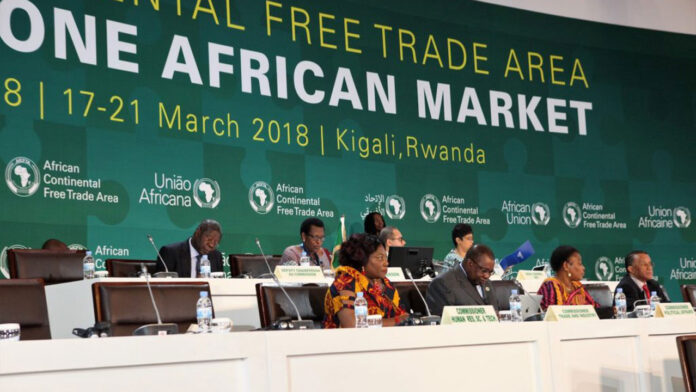Nigeria, Africa’s biggest economy, has been advised to sign and ratify the agreement on the Africa Continental Free Trade Area (ACFTA) its take-off.
The African Union (AU) gave the advice as the African Continental Free Trade Area gear to take off end of May.
ACFTA will cut tariffs to zero on 90 per cent of goods for member states in an effort to bolster intra-African trade and growth.
So far, 52 African countries have signed up, with only Eritrea, Benin and Nigeria still holding out.
“We are encouraging [Nigeria] to be among the founding parties and sign the agreement before May 30,” Albert Muchanga, the AU trade commissioner, said.
“Africa’s share of global trade is going to increase as a result of enlarging the domestic market,” he said. “It is in their interests to ratify.”
Intra-African commerce, which was worth about $170 billion in 2017, accounts for approximately 15 per cent of the continent’s trade.
By removing duties and addressing non-tariff barriers such as poor infrastructure and inefficient border posts, the AU hopes to help local companies grow by linking the continent’s small, fragmented economies in an integrated market of more than 1bn potential customers.
“Transform yourself to operate to the scale of the African Continental Free Trade Area. When you do that you will have the capacity to reach out to the rest of the world . . . That is the message we are conveying to the business people,” said Mr Muchanga.
Nigeria, also most populous nation, has yet to be convinced, concerned that free trade could hurt local industry that already benefits from a domestic market of more than 190m people.
We need to understand the costs and benefits to the Nigerian economy, so that we can take whatever actions necessary to mitigate any negative implications Mansur Ahmed, president of the Manufacturers Association of Nigeria
“I can understand the AU’s preference that Nigeria is a founding signatory — I fully understand that because Nigeria is an important anchor for Africa as a whole,” said Mansur Ahmed, president of the Manufacturers Association of Nigeria (MAN).
MAN is a powerful trade lobby that has been the chief organisation urging caution and preventing Nigeria from signing the agreement.
“But that is also why it’s so important that Nigeria’s participation is based on a clear understanding of . . . the agreement and the implications for Nigeria,” he said.
Of the 52 signatories, a threshold of 22 countries — including Ghana, Ethiopia and Kenya — have so far ratified the agreement, which will come into effect on May 30.
The trade zone will then be operational for those countries from July 7.




